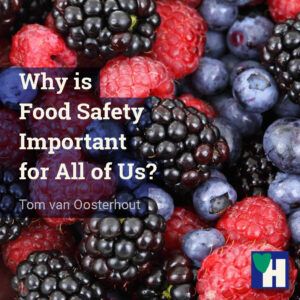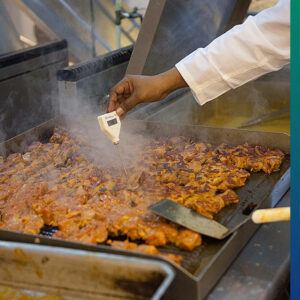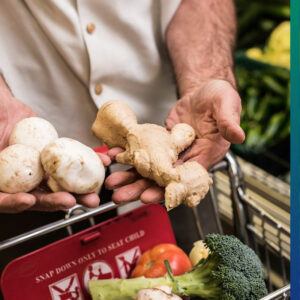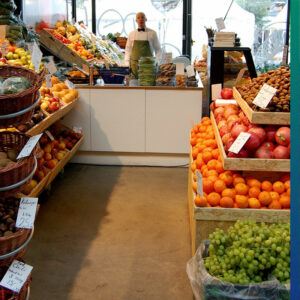
Why is food safety important and what is the connection with the food anxiety depression theory?
In the first article of this series, I explained food anxiety depression as a political, business, and scientific theory. From various perspectives, I tested the credibility of this theory. Specifically from the consumer perspective, this credibility seems very low.
Our behaviour gives away how confident we are about our food, as well as our fears and uncertainties. As has been referred to in the first article. Another indicator of confidence in food may be the consumer’s willingness to pay for greater food safety.
When it comes to food, citizens also have a lot of other priorities and worries. Governments, businesses, and (agricultural) scientists are mostly deaf and blind to these other concerns and anxieties.
Some of the links are affiliate links. As an affiliate associate, we earn a commission when you purchase any of the products offered through the shared links at no extra cost for you. This helps us maintain this website.
Table of contents
- 1 Why is food safety important?
- 2 The price of bacteria-free chicken
- 3 Why is food safety important?
- 4 All citizens have split personalities
- 5 In Food We Trust
- 6 Complex food systems versus changed risk assessments
- 7 Competence is the basic food safety value
- 8 Genetically Modified Organisms (GMOs)
- 9 Citizens don’t opt for zero risk
- 10 Constantly changing perspectives
Why is food safety important?
Consumers want to eat as healthy as possible, although we are not always willing to pay a high price for it. We think it is important for our health, but we also want convenience and freedom. Sometimes those interests clash.
The price of bacteria-free chicken

Consumers are willing to pay an extra 55 euro cents per kilo of poultry meat to halve the risk of contamination with salmonella and campylobacter jejuni bacteria. This is about 10% of the current price per kilo of non-organic chicken.
Salmonella is a bacteria that may cause typhoid fever. In Europe, campylobacter jejuni is the number one cause of bacterial gastroenteritis with almost 250,000 confirmed cases annually. Over 50% of the chicken sold in the UK carries the campylobacter jejuni bacteria.
TIP: never wash raw chicken because the drops spread the campylobacter jejuni bacteria through the entire kitchen.
The question is, of course, whether 55 euro cents per kilo of chicken meat is a lot or not. The question is also whether the consumer is willing to pay that additional price in the event of an economic downturn. Moreover, price is an instrument with which supermarkets, the main suppliers of poultry meat, fight each other.
Why is food safety important?
Whether consumers relate the costs of food safety, to their health and the price they have to pay for their daily groceries, is unclear.
Neither is it clear whether consumers relate food safety, their health, and the price of the groceries they buy, to some other of their very significant concerns. And there are many of those concerns, such as animal welfare, environmental pollution, biodiversity, and landscape, fair trade, or child labour.
However, all these concerns have to compete with other very important personal goals, such as freedom, economic well-being, and self-fulfilment.
All citizens have split personalities

There is another very serious problem. Government and business policies, and in their slipstream the sciences, treat us as split personalities. They separate our values such as our ethical position over animal welfare from the economic gains of agriculture.
At the same time, government and business authorities reproach us because we don’t connect our environmental demands with the price, quality, and safety of our food. Governments and businesses consistently oppose the domain of the citizen consumer to the domain of the ethical citizen.
However, businesses and governments do not seriously support citizens to pursue ethical goals when food is at stake. As a consumer, we’re told to vote with our wallets. As a citizen, we’re told to vote for the community with our best intentions. Some even claim that we have multiple personalities. How credible is that?
In Food We Trust

The lack of support from businesses and politicians when it comes to citizens’ ethical demands concerning food contrast with the support businesses and politicians get from consumers. Most consumers trust food products from supermarkets and small shops and responsible institutions.
Governments and business communities are very anxious over food-borne risks because of the possible damage to their image and legitimacy. This makes sense because the consumer puts the responsibility for food safety square in their hands.
Complex food systems versus changed risk assessments
There are two scientific explanations of the food anxiety theory.
The first explains that food production has become very complex. There is a lot of technology involved. The production and trade chains are long and global, and not very transparent. This complexity, supposedly, makes consumers insecure and anxious.
The second theory is that over time consumers have started to look at risks differently. Consumer nature and perception of risks have changed. Trust is inevitable. Without trust, consumers would not be able to eat anymore.
Competence is the basic food safety value

However, another explanation makes more sense. The best way to understand consumers’ attitudes towards food safety, is by assessing their shared basic values. Consumers’ trust is in general mainly based on those values.
Competence is the crucial value citizens share when it comes to food safety. Any loss of trust is caused by a perceived lack of competence. In the eye of the consumers, governments and businesses are competent when they seem to understand their trade.
The prevailing citizen’s perception of governments and businesses is critical trust. However, a lack of compassion, openness, and fairness on the part of governments and businesses, often cause severe breaches of confidence.
Genetically Modified Organisms (GMOs)
When it comes to food, citizens’ health is not the only issue at stake. Their health is not perceived as their only risk. As has been explained above, citizens are also anxious about political (power), economic (money), social, and ethical risks.
For example, genetically modified organisms (GMOs) are not seen by consumers as a threat to human health. Citizens worry about GMOs because they make food production dependent on a few (mainly American) multinationals.
Citizens don’t opt for zero risk
There are substantial differences in citizens’ perceptions of collective versus personal or family concerns. For example, high-voltage cables cause a few anxieties among the general public. However, when you happen to live underneath those cables, you will experience that those risks are mainly on your plate.
The number of victims of salmonella or campylobacter jejuni infections may be small, but if it happens to be your turn, you’re the one who’s racing to the loo every 5 minutes. And there is another perspective. The differences in opinions between food safety experts and the public are much smaller than is always assumed or are probably completely absent.
For example, zero risk is not the position citizens take. When weighing the advantages and disadvantages of food risks, people invariably consider the advantages to be more important than the disadvantages.
Constantly changing perspectives
Citizens’ perceptions about food, food safety, and the systems, institutions, and the people who are responsible for them, are structured in a complex way and are constantly changing. However, this knowledge in itself does not lead to more trust. Competent governments and businesses, which are experienced as the most reliable, contribute to more trust.
In my third and last article in this short series, I will argue that healthy consumers are hardly at risk of food-borne diseases. This means that governments and the food industry do a great job when it comes to food safety. However, they do a rather lousy job when it comes to other citizens’ concerns related to food.
Related: What is Sustainability in Food and How Can we Achieve it?
Tell us your experiences with food safety in the comment box below. Is food safety important for you?


I agree with you: “Governments and the food industry do a great job when it comes to food safety”.
And to answer your question, yes, food safety is very important.
I also want to mention that it’s good to always learn about the requirements of the state and country you live in. And always understand the cause and effect of these vile horrible things happening.
I haven’t read your previous articles of this series, so I don’t know if you covered what’s happening in some hospitals, restaurants, etc. People do not respect food hygiene as well.
The only thing I want to say about that is people shouldn’t be afraid to speak out to their manager or higher above authority if they notice something that goes against the hygiene rules.
Plus, The reassurance of the business operations and cleanliness must not be withheld from people above but must be reported for if not reported, your reputation and everyone else’s reputation will be affected, The business will be at risk, and the risk and harm of the contaminated foods will be much greater when people have already consumed the food matter.
Could you please submit the links of the first two parts of this series?
Hi Warren,
Thank you for your comment. It’s also flattering to see you agree with me.
You actually read the second article in a series of three. The third article is published next week. This is the link to the first article: https://ourgreenhealth.com/food-anxiety-depression/
I hope you enjoy the first article as much as you liked the second one.
Food safety is a very complex issue. Knowledge, skills, and experience are critical in containing the risks. When something goes wrong, human error always is to blame.
Policymakers and business managers are aware of these critical conditions. In contrast, consumers know very little of food safety risks, and are not willing to change this. An attitude that greatly contributes to these risks.
Unfortunately, the penalties for not respecting food hygiene rules in public places (such as bars, restaurants, and hospitals) are negligible. This makes it hard on staff to complain about breaches of food safety rules to their managers.
Social control might be a way to contain the risks of food safety. However, social control always has a flip side. Stool-pigeons are never very popular. This also makes it hard on staff to complain higher up in the hierarchy.
You might be a hero when you speak up, but this only lasts as long as your boss and colleagues tolerate such heroism. This is why ignoring food safety rules should be punished severely.
What will probably keep everybody alert and aware of food safety risks, is the importance of companies’ image. A good image comes on foot and leaves on horse back. After a serious breach of the food safety rules, companies suffer severe setbacks. They usually are very aware of these risks. What probably keeps them in line.
Stay safe, stay healthy.
Regards,
Tom
I really try not to be dependent on the government for safe food. Supermarkets are not to be trusted. They sell organic food, and later you watch TV and learn that they have not checked enough the sources of their food supply. That is really a bad sign.
I have a friend who has studied in Wageningen, the Netherlands, using pesticides on our food. He always tries in our discussions to convince me that supermarkets like Albert Hein are doing a great job by checking the level of the pesticides in their vegetables and fruits.
But honestly, I don’t trust that! That is why I only purchase organic produce from surrounding farmers, and I would love to see many people doing the same. But of course, it is unrealistic to think that some organically orientated farmers can keep up all the people’s supply. We have to radically change our idea of farming, and eat less meat and fish, so our bodies will get healthy, and our animals will live a good life, and our fish will recover and multiply again in the sea. Thank you very much for this informative article again. Stay safe and healthy, Tom!
Hi Sylvia,
Thank you very much for your comment and compliment. Basically I support the critical/trust-attitude towards government, supermarkets, TV- and other journalists, (scientific) friends, farmers, and the food industry in general.
Unfortunately, we’re not able to check all the links of the food supply chain ourselves. Without some basic trust, no food. It’s as simple as that. A lack of control, or even the idea of such lack, always makes us very anxious.
However, let’s take a look at the facts – and I’m not going into this ally too much because my third article in this series digs a little bit deeper in this issue.
Take yourself as an example. Are you able to relate any personal disease or impairment, of which I hope you have few or preferably none, to any type of food you consume? Of course, most effects of food on our health manifest only after a prolonged period of life. And perhaps even not.
Let me give an example. On an irregular base I drink a diet type of soda. No sugar is added. They do add of course an alternative for sugar. I’ve no idea which one. It also contains caffeine. The same university your friend visited (Wageningen), did a lot of research on the food hazards of all types of sodas.
They found that it’s very well possible that you get sick of drinking diet soda. There are, however, two conditions. The first is that you have to drink at least 10 liters a day (it was a big surprise to me that there are people who come close to such an amount of soda each day). The next condition is that you have to become at least 150 years of age.
Even when we take such research results with a grain of salt, it seems highly unlikely sugar free sodas are basically unhealthy. Of course, there are many other reasons not to drink such sodas. For instance because you don’t want to support commercial global companies.
If only we would be able to organize the same kind of global power as these companies have to change agriculture for the better! Now that would be something.
Let’s try to work on that challenge.
Stay safe, stay healthy.
Regards,
Tom
Hi Tom, we have a long time ago given our power away. Government and big companies have taken over and dictate to us how and what to buy. My experience is to look out for GMO’s, processed food, sugar and carbs, because that is bad for your body. It contaminates and influences your health.
In my opinion, if you live too hygienic and sterilise everything, your body does not get enough germs to build a healthy immune system.
Living in Africa we are a perfect example. Most of us have healthy immune systems and can tolerate a lot without getting sick. Maybe that is why Covid did not have a great effect on us.
One has to be cautious of salmonella and food poisoning, that is true.
Living healthy is a huge part of our everyday life. Because we are image people we want the fruit and veggies to look perfect, instead of going for homegrown natural products. We should all put our money where our mouths are and dictate what we want?
Thank you for an enlightening post!
Estelle
Hi Estelle,
Thank you for your comment and compliments.
When I read your comment, I remember that I forget to emphasize that we ourselves also have a substantial responsibility when it comes to food safety. As you so clearly explain.
We are also in a strong position to influence governments and businesses for the better by either choosing the politicians who adhere to our wishes or by buying the food products which are better for our health. Unfortunately, not everybody shares our beliefs.
During the past 10 years, I got more interested in the question of how Africa is doing from the perspective of food supply.
Let’s take Nigeria, for example. There live more than 200 million people. As far as I am aware, there is no structural famine in Nigeria.
This means that all 200 million Nigerians eat enough food, every day. All that food has to come from somewhere, every day. That is quite an achievement.
This made me more and more look at Africa in an entirely different way. The potential for sustainable agriculture there must be tremendous. Let’s hope this is the same in other African countries.
For now, stay safe, stay healthy.
Regards,
Tom